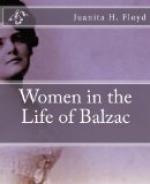of the Emperor to become Madame de Balzac. The
difficulties connected with her marriage consisted
in the fact that having been left sole heiress of her
first husband’s immense wealth, she did not
think herself justified in keeping it after she had
contracted another union, and with a foreigner.
She therefore transferred her whole fortune to her
daughter, reserving for herself only an annuity which
was by no means considerable, and it was this arrangement
that had to be sanctioned, not by the sovereign who
had nothing to do with it, but by the Supreme Court
of Russia, which at that time was located in St. Petersburg.
Balzac, however, wishing to impress his French relatives
with the grandeur of the marriage he was about to
make, imagined this tale of the Czar’s opposition,
in order to add to his own importance and to that
of his future wife, an invention which revolted my
aunt so much that in that part of her husband’s
correspondence which was published by her a year or
two before her death, she carefully suppressed all
the passages which contained this assertion which had
so thoroughly annoyed as well as angered her.
I have sometimes wondered what she would have said
had she seen appear in print the curious letter which
Balzac wrote immediately after their wedding to Dr.
Nacquart in which he described with such pomp the
different high qualities, merits, and last but not
least, brilliant positions occupied by his wife’s
relatives, beginning with Queen Marie Leszczinska,
the consort of Louis XV, and ending with the husband
of my father’s stepdaughter, Count Orloff, whom
the widest stretch of imagination could not have connected
with my aunt.
I cannot refrain from mentioning here an anecdote
which is very typical of Balzac. He was about
to return to Paris from Russia after his marriage.
My aunt coming into his room one morning found him
absorbed in writing a letter. Asking him for whom
it was intended she was petrified with astonishment
when he replied that it was for the Duke de Bordeaux,
as the Comte de Chambord was still called at the time,
to present his respects to him upon his entrance into
his family! My aunt at first could not understand
what it was he meant, and when at last she had grasped
the fact that it was in virtue of her distant, very
distant, relationship with Queen Marie Leszczinska
that he claimed the privilege of cousinship with the
then Head of the Royal House of France, it was with
the greatest difficulty and with any amount of trouble
that she prevailed upon him at last to give up this
remarkable idea, and to be content with the knowledge
that some Rzewuski blood flowed in the veins of the
last remaining member of the elder line of the Bourbons,
without intruding upon the privacy of the Comte de
Chambord, who probably would have been somewhat surprised
to receive this extraordinary communication from the
great, but also snobbish Balzac.




